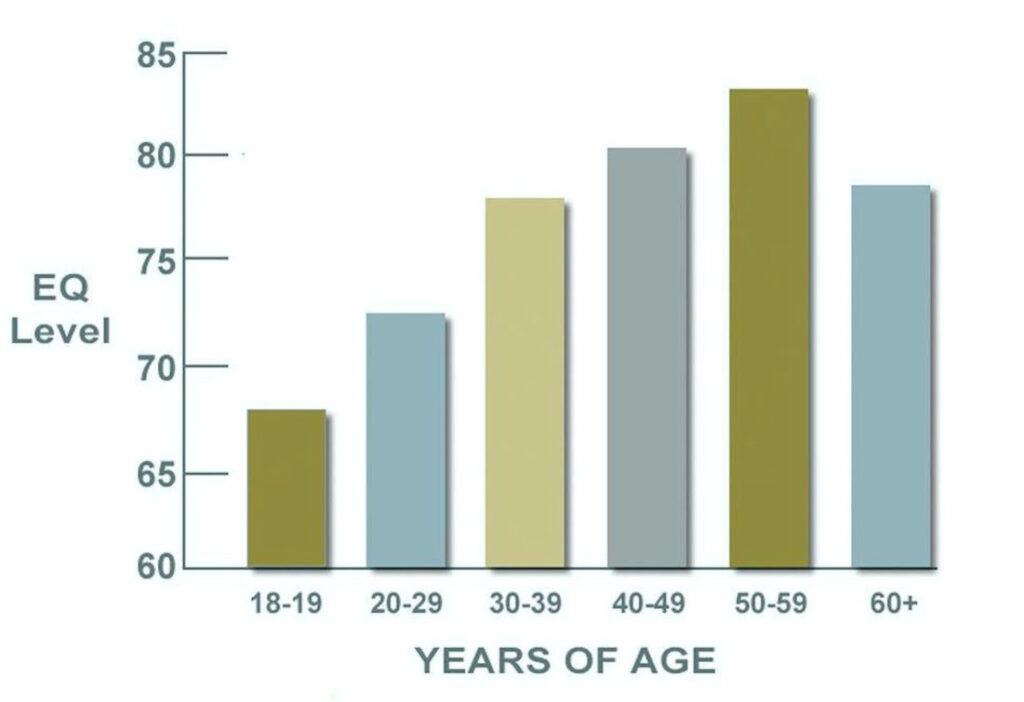Levenson’s team studied 144 participants who ranged in age from their 20s to their 60s. He asked the individuals to watch a series of video clips designed to elicit different emotions, like disgust and sadness. These volunteers were asked to manipulate their emotions in response to the nasty or heart-rending clips—either to remain unmoved or to try to see the upside of whatever they witnessed on screen.
Which age group was best able to reinterpret and re-contextualize the images?
The researchers found that the older the participant, the better they tended to be at putting the videos in perspective. Levenson went on to say, “Evolution seems to have tuned our nervous systems in ways that are optimal for these kinds of interpersonal and compassionate activities as we age.” He cites a TalentSmart study that showed the following trendline regarding emotional intelligence.

Okay, now we move from the scientist to the practitioner. Here’s my unstudied instinct on how my EQ has improved with age:
1. I feel more compassion for others.
I define wisdom as “metabolized experience that leads to distilled compassion.” As I age, I’ve softened…and not just around the belly. I experience less ego and more soul. Fortunately, some of that increased compassion is directed toward me, which is part of the reason the U-curve of happiness research shows that we get happier with each decade after age 50.
2. I am less emotionally reactive and more self-aware.
Our emotions learn to moderate, partly because we learn not to sweat the small stuff. Simultaneously, our pattern recognition of our habits and tendencies allows us to observe ourselves more effectively.
3. I don’t take things so personally.
Don Miguel Ruiz, the author of “The Four Agreements,” says, “There is a huge amount of freedom that comes to you when you take nothing personally.” This is particularly valuable in our polarized, “cancel culture” era. When in doubt, I assume the best intentions in people.
4. I have a better understanding of how to create my ideal habitats.
Social scientists call this “environmental mastery,” the ability to determine which environments one will flourish in and the capacity to adjust and adapt to changes in those habitats. This also speaks to why older people on a team have been found to create more “psychological safety” on teams because their compassion and environmental mastery help them create the proper “psycho-hygiene” for social flourishing.
5. I value relationships more.
It’s been said that the two questions people ask on their deathbed are, “Did I love well, and was I well-loved.” The Harvard longitudinal study on healthy aging and the Blue Zones research conclusively shows that longevity is greatly enhanced based upon the relationships we cultivate in our lives. It’s part of the reason why the first thing many of us wanted to do when we were let out of our home prisons during the pandemic lockdown was to see family or friends.
Okay, I know some of you want to present exhibit A: your 75-year-old, perennially crusty and grumpy uncle. Your mileage (and your uncle’s) may vary, but the research and maybe our own lived personal experience are conclusive. If you focus on developing your emotional intelligence, you will have another kind of EQ— Enhanced Quality of life—and that’s an EQ we can all appreciate as we age.
P.S. My podcast interview with Rich Roll went live yesterday. I think you’ll enjoy it.
